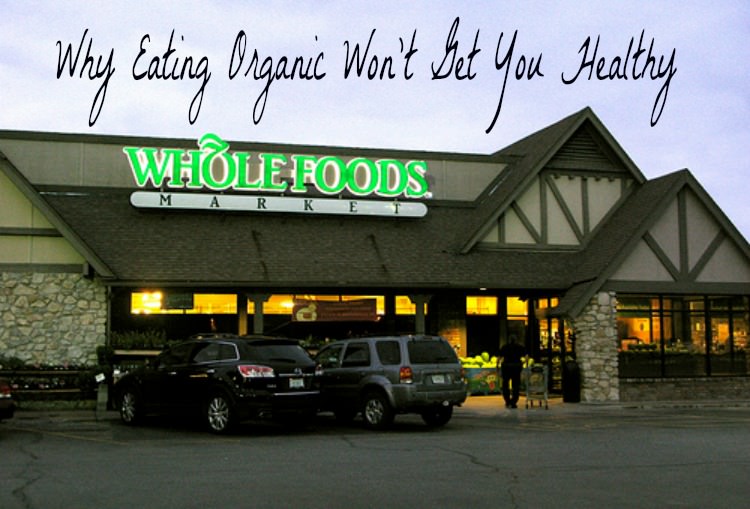
High five!
You’ve made some big changes in your family’s diet recently and are really focusing on eating organic. You’ve stopped buying boxed cereal and other processed snacks at the grocery store and are making homemade snacks and treats with wholesome ingredients instead. You’re even sprouting or soaking nuts and seeds and even your legumes and grains!
You’ve joined an organic fruit and veggie co-op and made the switch to grassfed locally produced meats. You’ve even taken the wise step of incorporating raw grassfed milk into your family’s diet.
While all these changes are wonderful and beneficial compared with how you’ve been eating, I’ve got some tough news for you.
These changes alone are not going to get you healthy.
Eating organic is not the way to health shocking as it may sound!
Gulp.
How can this be, you ask? Your diet is now light years ahead of where it was. How can this organic, whole foods diet not result in vibrant health?
Let me tell you a little story ….
The Telling Tale of the South Sea Islanders
The first Europeans to visit the South Sea Islands in the 1700’s were Captain Cook and his crew. Tahiti was truly a paradise with beautiful people whose frequent smiles revealed perfectly straight, pearly white teeth.
Dr. Weston A. Price found the same blissful environment nearly 200 years later when he arrived with his wife to study these happy, healthy people. Dr. Price noted that the bone structure of the South Sea Islanders was the most perfect of any of the 14 isolated traditional cultures he studied during his travels around the world in the 1920’s and 1930’s which he documented in the amazing book Nutrition and Physical Degeneration.
The traditional diet of the South Sea Islanders was high fat, consisting of seafood and pork with coconut the most important plant based staple. Tropical fruits and other plants were also consumed as there were plenty available in such a temperate and ideal growing climate.
The environment and water were, of course, pristine and food was abundant.
Wouldn’t such an organic, whole foods diet be enough for health?
No, it was not.
The South Sea Islanders knew from observation and perhaps instinct that their clean, whole mixed diet was not enough to maintain their own health or to produce healthy babies and children.
The Sacred Food the South Sea Islanders Could Not Do Without

Despite having plenty of whole, nutrient dense foods available during all times of the year, the South Sea Islanders risked their lives over and over again to hunt sharks.
Once a shark was caught and brought to shore, the liver was removed and put inside the shark’s stomach which was then hung on a tree to ferment.
The oil that came out of the shark liver as it fermented provided a plethora of fat soluble vitamins A, D, and K2 to the South Sea Islander diet that was the critical missing link for vibrant health. This oil was given to growing children and young adults who were about to get married and also to pregnant women. Such oil would have been critical to maintaining health into advanced age as well.
Dr. Price knew from research that the level of fat soluble activators in the South Sea Islander diet was about 10 times higher than the Americans of his day … and processed, devitalized foods had not even arrived in full force yet!
Fat Soluble Vitamins More Important Than Eating Organic
The story of the South Sea Islanders illustrates the critical nature of the fat soluble vitamins in the diet. Without them, no matter how pure, whole and organic a diet may be, health will not be maintained nor healthy children easily produced.
The fat soluble activators A, D, and K2 supercharge mineral absorption into the body tissues and enhance the health and function of every organ system.
Fortunately, fermented cod liver oil and fermented skate liver oil are available today that are very similar to the fermented shark liver oil consumed by the South Sea Islanders.
Please note that the typical brand name fish or krill oil and even cod liver oils on the market are highly processed, industrialized, rancid, deodorized oils that should be avoided. Only fermented cod and skate liver oil is processed with no heat as practiced by traditional cultures.
I have been taking these types of oils for many years and would never consider my whole foods diet complete without them. Why reinvent the wheel and experiment with the latest and greatest silver bullet supplements that seem to change every few months when traditional cultures such as the South Sea Islanders already knew what it took to have healthy babies and stay vibrantly healthy well into old age?
Where to Source Fermented Fish Liver Oils
Please refer to my Resources page for a list of companies that offer clean, purified fermented fish liver oils to provide your whole foods diet with the critical fat soluble activators A, D, and K2.
What to Do if You are Allergic to Fish
If fermented cod or skate liver oil aren’t possible for you due to a seafood allergy, note that you can obtain fat soluble vitamins in other foods valued by other Traditional cultures such as raw, grassfed butter (must be deep yellow to orange in color – sources), fish eggs (many can tolerate fish eggs even with a seafood allergy), emu oil from emus eating their native diet (sources), deep orange yolks from pastured hens, and liver from land based animals.
Sarah, The Healthy Home Economist
Source: Nutrition and Physical Degeneration, Dr. Weston A. Price DDS








Igrabbed a bag of organic corn chips and a jar of organic salsa for dinner with a bottle of organic lime soda. Just kidding. We actually had a nice big warm spinach salad (from a local chemical free farm) with garlic and olive oil dressing drenched in lemon juice and red crushed pepper, whole wheat pasta and anchovies on the side. That’s the difference between eating organic and nutrient dense.
All I need to do is to look at my 4 grand children and see how they have grown in much better health and all aspects by following the health plan that their parents have adopted. We each have our own opinions and options that we go for and try….I would always encourage organic fruits and veggies..the quality of soils also plays a very important role in the quality of the fruits and vegetables…In Oregon there is a very strict code that is overseen by Oregon Tilth….I would definitely do research on line to find out facts.
Thank you for the info
Why the heck is everyone fighting about such stupid stuff?? Get the best food you can afford. That’s it, it’s simple. Do the research. Don’t depend on other people to tell you just what you need to do to be “healthy”. There’s no personal responsibility in this country anymore!
I don’t see any science here… just an outdated anecdote about Pacific Islanders that may or may not have anything to do with reality.
My friend Raederle Phoenix has some recipe books that, while they do not include meat, do include high nutrient density. See Raederle.com.
I read your post on your blog. My issue is with your advice to the pregnant (or planning) mother to be. You are not a health practitioner and therefore should at least be making a comment that you are not dishing out medical advice. Taking fermented cod liver oil will not prevent congenital defects like spina bifida. There are other nutrients that are typically deficient in American females that should be consumed in a good quality prenatal vitamin. Stop giving out medical advice. I’m ready to unfriend you. BTW, I’m a Clinical Nutritionist.
Rana – check out Nourishing Traditions by Sally Fallon! Take it slowly, there’s a lot to learn. I was a vegetarian (and sometimes vegan) for 18 years; I’m a little over a year into traditional foods, and am still a newbie. When you first look at NT (aforementioned book), read the front parts, and decide what aspect to start with (e.g. Grass fed meats, organic produce, raw dairy, fermented beverages, fermented foods, soaked beans/grains, supplements, etc.)
The order I started off w/ (I was already eating a mainly organic diet):supplements, fermented beverages (purchased, then made), raw dairy, grass-fed meats, and now that I’m adding grains and beans back into my diet, soaking. Meal planning is still something I haven’t come close to mastering!
Umm who actually READ the article? At what point did Sarah demonise Organic foods?? She certainly did not! ALL she was saying was that eating organic foods is NOT ENOUGH… it’s ALSO important to eat nutrient dense foods! That’s it! At no time was it ever implied that organic foods are not an important part of a healthy diet.
Bravo JOSEPH and WENDY. This blog post seemed very one sided and seemed to discourage people from eating organic. I think avoiding GMOs is a top priority, and would not eat cod liver oil from fish produced with GMO feed. I think the post title should have suggested something about the benefits of cod liver oil and nutrient dense foods rather than demonizing Organic foods.